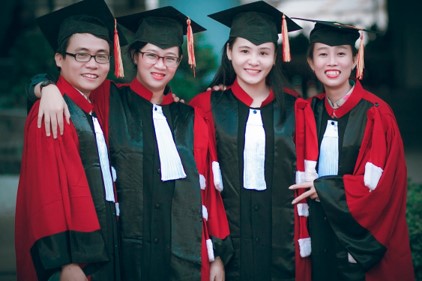The recent U.S. college admissions scandal was a big deal, but in China, cheating to get into universities abroad is commonplace. Writer David Schuessler argues that we need to enact measures to combat unscrupulous education consultancies and unethical admissions practices — for the benefit of everyone, not least of all the students themselves.
The March revelation that William Singer of the admissions consultancy The Key had masterminded a high-level bribery and test-rigging scheme to help the children of wealthy parents gain admission into highly ranked U.S. universities shone a spotlight on an industry that has long operated in the shadows. For years, universities’ inability to curb ghostwritten applications, falsified transcripts, and fraudulent letters of recommendation has emboldened firms like Singer’s to repeatedly push the envelope for what constitutes a valid consulting service.
To be sure, China has its own history of unethical admissions consulting practices. As early as 2010, Tom Melcher of Zinch China — once one of the largest consulting companies advising U.S. schools about China — estimated that as many as 80 percent of all Chinese students at U.S. universities used a private admissions consulting service during the application process, many of which do not meet the standards outlined by the National Association for College Admission Counseling. Based on a survey of Chinese students, Zinch estimated that 90 percent of Chinese applicants had forged some or all of their letters of recommendation, 70 percent had gotten their essays ghostwritten, and 50 percent had falsified their academic transcripts.
But while recent reports have focused on the misdeeds of consulting companies, there’s been little coverage of the psychological toll these services have on the students who use them. They can have an especially profound effect on students from China, who already face numerous challenges in U.S. universities, including language barriers and differences in educational values.
In a 2015 op-ed, University of Arizona professor Adele Barker wrote that every one of the 20 Chinese students in her intro-level history course had failed, largely because they were unable to understand her lectures, complete the readings, or write papers in English. Barker pointed to specialized courses that teach students how to game the TOEFL exam — one of two widely recognized English proficiency tests — as well as other ethically questionable practices to explain how such unqualified students were able to enter an American university in the first place.
In China, private educational or admissions consulting firms commonly provide these services. The more ethical ones simply help students prepare for an academic experience very different from the one they’re used to. However, many boutique consultancies — and at least two of the country’s largest private admissions consultancies, New Oriental and Dipont Education — have been accused of unethical behavior, including ghostwriting entire applications.
But by helping students game the system and gain admission to schools higher ranked and more academically rigorous than they would have otherwise entered, consulting services may be doing them a disservice in the long run. Chinese students have a high dropout rate in the U.S. Many also experience depression and anxiety and have difficulty keeping up with their studies.
According to an EIC Education report, in 2013, only 75 percent of Chinese students at Ivy League schools graduated — 20 percent lower than the Ivy League average. According to the report’s authors, this was because the students — all high-achievers in China — struggled to adapt to the different educational system and overcome language barriers.
As a result, many Chinese international students are stressed, depressed, and overwhelmed at institutions for which they may not be fully qualified. According to a 2009 mental health survey of Yale University students, 45 percent of the school’s Chinese students reported symptoms of depression and 29 percent reported symptoms of anxiety. A separate study found roughly 32 percent of Chinese students at a selective midwestern U.S. university were at a high risk for depression. By comparison, a 2009 survey found that roughly 9 percent of all U.S. university students reported having been diagnosed or treated for depression in the previous year, and about 9.5 percent for anxiety.
One of the key reasons for Chinese international students’ elevated levels of stress is academic pressure. Of the 45 percent of Chinese students at Yale who reported feelings of depression, the most commonly cited potential contributing factor was academic stress. Meanwhile, a separate 2015 study found that 8,000 Chinese students were expelled from U.S. universities during that academic year alone — more than 80 percent of them for poor academic performance or dishonesty.
This data indicates that Chinese students are struggling at U.S. schools in part because they paid consultancies to ghostwrite applications or fake other documents to get them into schools for which they aren’t prepared.
If we want to put an end to unethical admissions practices and help Chinese applicants earn admission to universities better suited to their academic capabilities, we need to start by regulating consultancies. At present, most of these services operate without oversight, and there are few institutional checks preventing students, families, and even schools from requesting or becoming complicit in unethical behavior.
To begin, national education ministries or departments must establish a legal standard for the services consultancies provide. Can consultants rewrite a word of a student’s essay? How about a clause? A sentence? While a student’s school or university typically handles plagiarism and cheating cases internally in the U.S. and the UK, there is a growing trend toward making these offenses illegal. In 2017, for example, the British Department of Education announced that it was considering criminalizing “contract cheating” — a category that includes ghostwriting essays.
In China, it’s already a crime for students to cheat on the gaokao, the country’s college entrance exam, but there are no current laws barring students from cheating on their applications to Western universities. Whether in China or in the West, making it illegal for students and consultancies to fake application materials would be an effective deterrent against such behavior.
Another way to combat unscrupulous consultancies would be to make the application process more like a standardized test. This can be achieved by requiring students to complete their applications and essays together in a timed, single-access, and potentially proctored environment. This would help schools prevent students from receiving outside help when filling out their applications.
Timed applications could also include a reading comprehension section to ensure that a student’s true English level matches their TOEFL and SAT verbal or essay section scores. Already, the Harvard Extension School includes a one-hour online reading comprehension assessment and essay-writing section as part of the application for many of its master’s degree programs. Other schools have started requiring international applicants to participate in recorded interviews and submit timed writing samples to supplement their applications.
Singer may have been caught, but unless universities take action to curb problems like essay ghostwriting, transcript falsification, and fraudulent letters of recommendation, it’ll likely be business as usual for the vast majority of unethical consultancies — both in the U.S. and around the world. If stronger measures are taken, however, students will hopefully find it harder to fake their way through an application. And who knows? Maybe they’ll end up spending more of their time in high school working to truly become the student that they would have otherwise paid a consultancy to help them pretend to be.
Article featured on SupChina
Author: David Schuessler, Co-founder & CEO of Tuding

